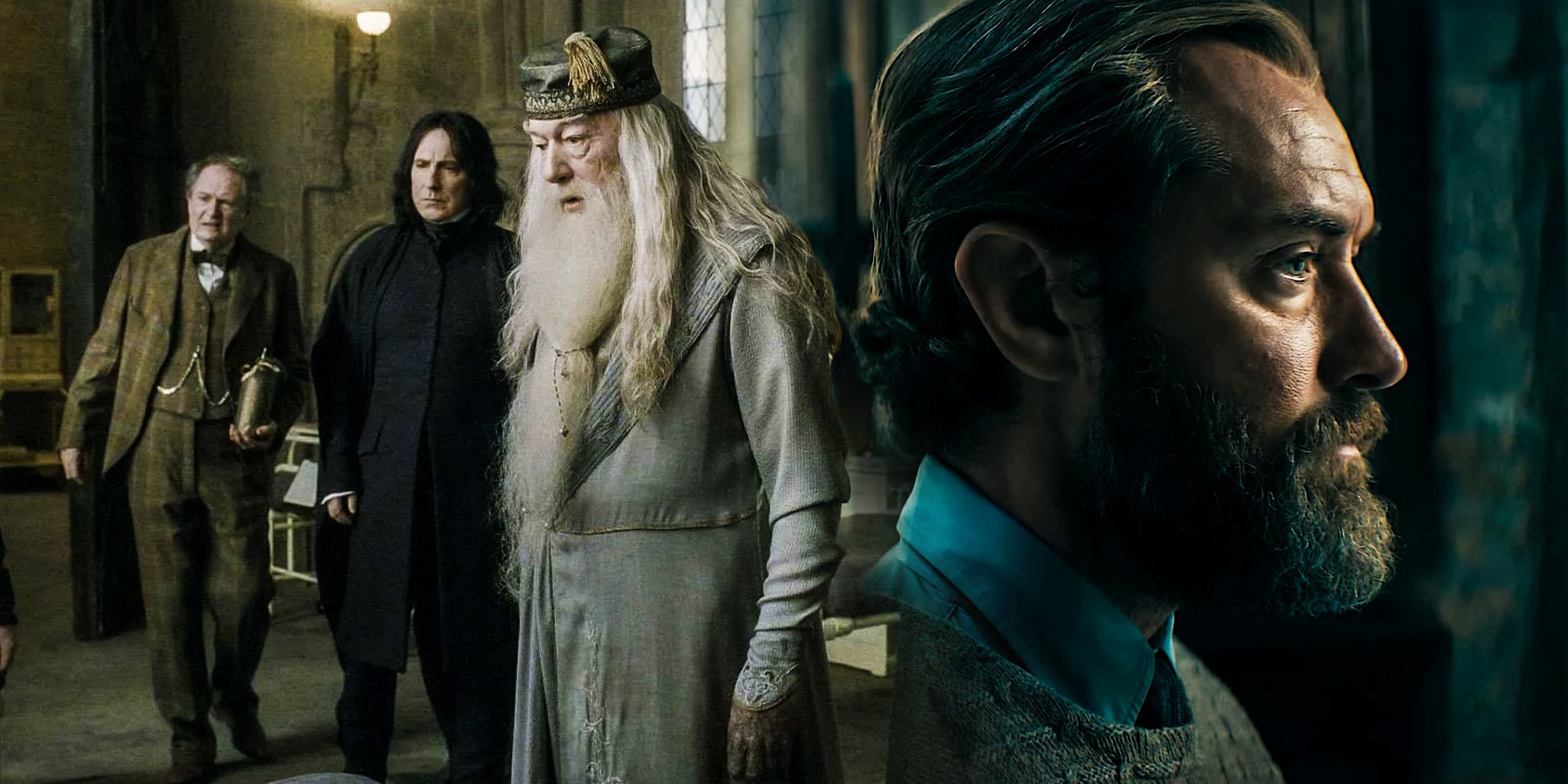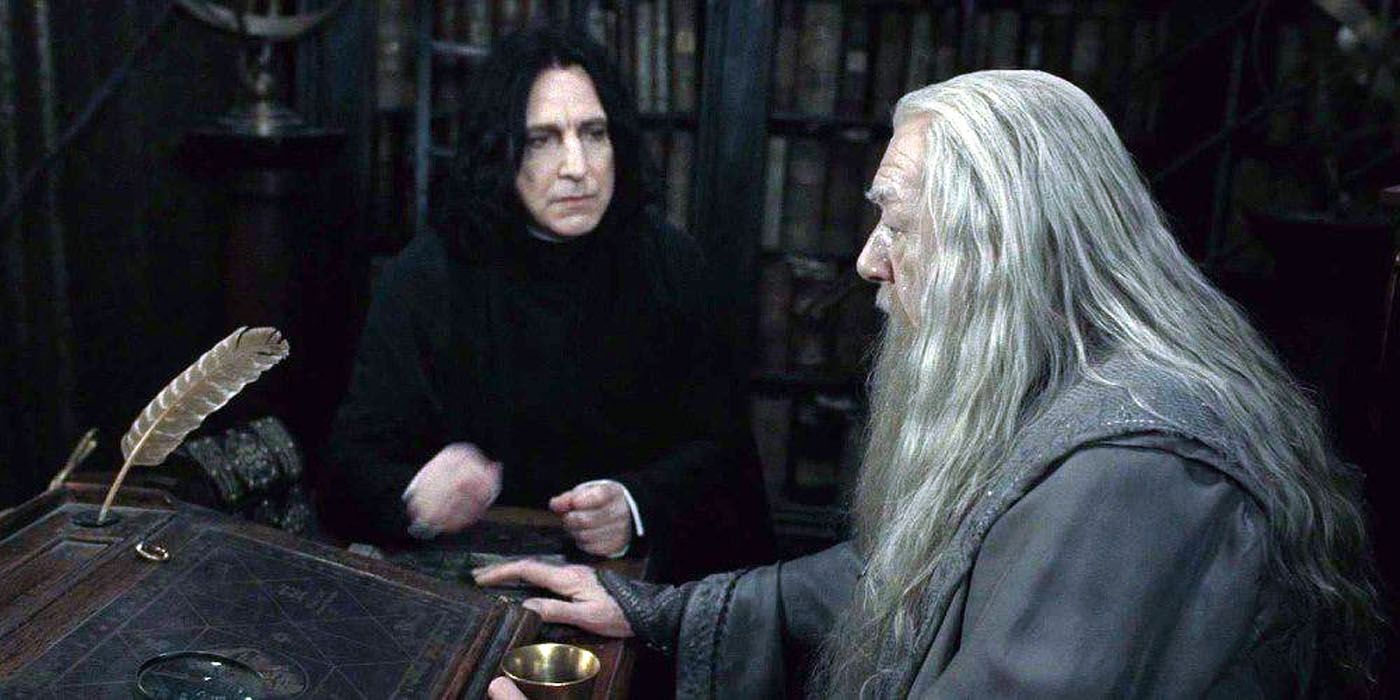Warning: SPOILERS for Fantastic Beasts: The Secrets Of Dumbledore below.
Fantastic Beasts: The Secrets of Dumbledore explores the blood pact Geller Grindelwald and Albus Dumbledore shared in their youth, which adds tragic complexity to Professor Snape's unbreakable vow in Harry Potter and the Half-Blood Prince. Unbreakable bonds are a type of magic commonly featured in the Harry Potter universe, and the reveal of Dumbledore's experience with binding charms in Fantastic Beasts 3 supports the notion that he can personally relate to Snape.
In Harry Potter and the Half-Blood Prince, Severus Snape (Alan Rickman) undergoes an unbreakable vow with Draco Malfoy's mother, Narcissa Malfoy (played by Peaky Blinders' Helen McCrory) where he promises to protect Draco until the boy kills Dumbledore but will kill Dumbledore himself if he fails. Dumbledore is aware of this because he wants Snape to kill him as a way of gaining Voldemort's trust and succeeding in a double-cross. Draco is unable to kill Dumbledore, so in the last act of Harry Potter and the Half-Blood Prince, Snape does as he has been requested to do, which fulfills the vow's contract.
As is revealed by the Fantastic Beasts movies, Dumbledore (Jude Law) was familiar with unbreakable vows at the time because the blood pact that he and Grindelwald (Mads Mikkelsen) created together is supposedly eternally binding. They bound themselves together when they were young because they were in love. Years later, when Dumbledore needs to defeat him, this pact causes problems because the charm makes it so they cannot hurt each other unless it is broken. When Dumbledore and Snape scheme to take down Voldemort, the former's trust of and sympathy toward the latter are explained by his past with Grindelwald and his understanding of the inescapability of a magical bond. He knows that by committing to the unbreakable vow, Snape will not be able to back out of killing Dumbledore without dying.
Snape wants to fight for good as much as anyone else does in Dumbledore's army, and by acting as a plant in Voldemort's troops, he sacrifices his emotional comfort and the trust of various colleagues (for example, Minerva McGonagall). He also cannot change his mind about being the one to kill Dumbledore, which Dumbledore must have felt deeply about because of the tragic irreversibility of his own blood pact with Grindelwald. This connection expounds upon Dumbledore's unbridled trust in Snape's loyalty, which is only briefly explored in Harry Potter and the Deathly Hallows — Part 2.
The blood charm Dumbledore carries with him in Fantastic Beasts 3 breaks by the end of the movie, and he and Grindelwald are finally able to battle each other. The charm is not the same magic as an unbreakable vow, but the effect is similar enough to draw a comparison. Furthermore, when Dumbledore can finally fight with Grindelwald, he is unable to win when he's given a surefire chance. There is an obvious love still simmering between him and Grindelwald that, despite the charm shattering, proves their bond is as unbreakable as it always was. So, it would be impossible for Dumbledore not to understand on a personal and empathetic level what Snape is sacrificing by vowing to Narcissa.
The pact Dumbledore forged with Grindelwald in his youth, as divulged in Fantastic Beasts: The Secrets of Dumbledore, promotes a stronger bond between him and Snape. His loyalty to Grindelwald is as inescapable as Snape's vow to kill Dumbledore, which makes their dynamic in the final Harry Potter movies much more tragic. Snape and Dumbledore's companionship will remain one of the most integral dynamics in the franchise especially with Dumbledore's background bringing to light this deeper context.


